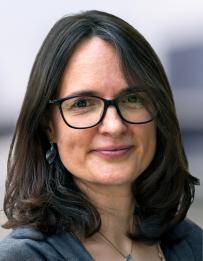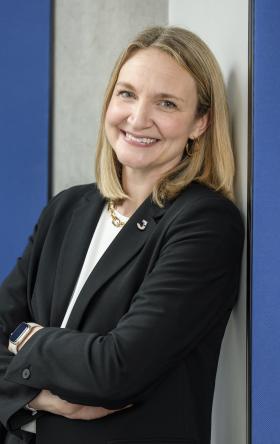Meet Jenny Jones
Chelmsford, England, U.K.

A love of the natural world inspired by growing up pond dipping and fishing with her family, teaching herself musical instruments and learning many different styles of dancing have complemented Jenny Jones’s career as a transport planner, equipping her with the vital skills of observation, collaboration and a love of learning.
As a geographer by background, Jenny has never lost her curiosity for how the natural world and human society connect and influence each other — it underpins her love for her transport planning profession.
Jenny’s inspirational leadership and unique balance of technical and people skills have supported the global success of her 400-strong team of transport planners and specialists, one of the largest in the U.K. and Ireland. This team embodies a range of skills, backgrounds and capabilities working together with wider disciplines to support the delivery of the greatest social, economic and environmental outcomes for clients.
Jenny started her career in transport planning after graduating with a geography degree from the University of Nottingham. She joined a consultancy with just two other transport planning colleagues, but in the 24 years since then, Jenny’s roles across companies have grown exponentially in scale, challenge and responsibility. Jenny has specialized in transport planning throughout her career but has also worked in multidisciplinary programs and framework environments where cross-disciplinary solutions are the key to project success.
This well-rounded experience has led to Jenny’s T-shaped leadership style and several trademarks of her success. The first is her ability to build strong relationships with her clients, especially in the local government sector. The second is her ability to develop and lead multidisciplinary teams — which is essential in her global responsibility as a capability director. Jenny brings together specialists from the U.K., Ireland, Poland and India to deliver the greatest outcomes for her clients across the world, deploying, developing and growing talent and skillsets. The capability director role is critical in driving cross-disciplinary collaboration to deliver client solutions across a range of markets. In addition to identifying and nurturing the technical skills for now and the future, and deploying the right expertise in the right place at the right time, Jenny creates a culture and environment that’s authentically inclusive and unlocks creativity and innovative thinking driven by leveraging diversity of thought. In Jenny’s words: “People are absolutely everything in our business; getting the best out of people is what drives me, along with solving our clients’ most complex challenges.”
“People are absolutely everything in our business; getting the best out of people is what drives me, along with solving our clients’ most complex challenges.”
Get to know Jenny
-
400 +
transport planners currently working under Jenny's leadership
-
£ 2.4 B
funding secured in the last ten years for local authority clients to deliver multi-modal schemes
-
6
Jacobs' Transport Planning capabilities
-
4
musical instruments Jenny can play (piano, recorder, organ and electric guitar)
How are you helping to solve our client’s biggest challenges?
The way we work: The challenges are continuously evolving and we’re constantly adapting, but our work principles empower us to get to solutions which are appropriate and add value for our clients. Transport planners are typically engaged right at the start of solution development by supporting with understanding and evidencing the challenges and problems. By developing a true understanding of the multi-faceted nature of the problem we’re trying to solve, we're then able to develop strategies, test future scenarios, develop and sift multi-modal options, engage with stakeholders, build compelling business cases and develop front-end feasibility designs which reflect the place and connections needed by the end users.
To drive excellence in delivery for our clients, we’ve created a strategic framework of six capabilities within our transport planning offering to support best practice sharing and learning and the seamless identification of the right expertise to meet client requirements. While we have deep domain specialists within these capabilities, many of our team members work across them — enabling a holistic and value-adding consultancy offer.
The solutions we develop: The challenges that our clients are facing now, especially in the U.K. local government market, are unprecedented. There’s a colossal rising demand for services, including adult and social care, against declining budgets. This complexity is compounded by the climate emergency, which is looming large when spending opportunities are scarce.
Over the last ten years, we have helped our clients to secure over £2.4 billion ($3.1 billion) additional funding to deliver a range of multi-modal transport schemes. Over recent years this has had an increased focus on active travel and place-based schemes in line with Government priorities. We are increasingly engaging with our clients in identifying revenue generation opportunities, strategies to manage and optimize the ever-increasing cost burden of assets and to, for example, improve Home to School transport, as well as working on place-based strategies to deliver safe, economic, social, environmental and health-based outcomes and modal shift to active modes.On top of this, we're learning to embed carbon reduction and biodiversity net gain into our schemes and supporting energy transition using cutting-edge data analytics. In summary, we’re creating safe, resilient strategies that deliver economic, social, environmental and health-based outcomes, including the behavioral shift to active travel modes.
Jacobs has also made smart investments within this space. Our global analytics tool, StreetLight Data, provides opportunities to use big data to answer mobility questions we couldn't answer before and provide insights in real time. This is incredibly exciting for us, and it opens new opportunities for our U.K. clients.
What are the biggest opportunities in transport planning?
All the challenges outlined above are opportunities for us to support our clients and the communities they serve, but I’d emphasize the role of embracing broader, deeper data sources and novel analytical techniques to dramatically improve our insights.
At Jacobs we’re proactively investing in data analytics skills through data science apprenticeships, which is helping us to develop powerful data visualization, leverage the power of machine learning and embrace opportunities associated with AI to drive efficiency and empower better decision-making. We’re also developing new ways of understanding and gaining insight into the movements and trip-making of populations through population synthesis and agent-based modeling approaches.
Modeling people, not vehicles, can provide us with a very different lens in terms of understanding why and how people are moving. We need to maintain a focus on the more invisible communities that we’re serving. It’s well documented through books like Invisible Women by Caroline Criado that from a gender perspective we lack data and insights as well as the right behaviors at times to truly account for these differences and develop genuinely inclusive solutions. The same goes for other groups, such as rural communities, where social exclusion can have major impacts. Our approach builds on the gender and transport research undertaken by my transport planning colleagues Sherin Francis and Katie Pearce.
We’re also exploring P3 partnerships and third-party funding for clients. Public sector funding is becoming increasingly scarce, so we’re looking into how we can leverage private investment and bring together different stakeholders. It can potentially help clients generate revenue or ease affordability pressures.
How do social value and sustainability integrate with future mobility?
While the post-pandemic world has adjusted some of our travel behaviors and expectations, people still need to move around, whether for employment, leisure, caring, education or other needs. As transport planners, it’s critical that we understand those shifts and explore how we can support this movement of people and goods without adverse impacts on the environment, without leaving some people and communities behind and while also promoting healthy, safe and sustainable options. Inclusive future mobility is a key opportunity to address this, whether through energy transition for buses and cars, mobility hubs, digital demand-responsive transport to support rural accessibility, electric bikes and scooters in urban areas, autonomous vehicles or smart ticketing. Transport planning should seek to remove social exclusion and support social mobility — delivering benefits for all, not just a select few.
What are the skills that are key for future growth in your sector?
One area focuses on combining analytical skills, which are essential for growth, with storytelling ability. The latter allows us to convert the technical data into something that a range of stakeholders — not just planners and engineers — can understand and relate to. This includes data visualization and is linked to our skills in developing compelling cases for investment.
Another area is Triple_Access_Planning (digital accessibility, spatial proximity and mobility) where we need to develop skills that consistently embrace a vision-led approach to deliver more holistic outcomes with a genuine focus on place. At Jacobs, transport Pplanning collaborates with our Cities & Places and Transportation end markets, demonstrating our focus on transport as an enabler in creating the inclusive, safe and accessible places of the future.
What project or program are you most proud of?
While I work with many clients across different geographies, I'm most proud of my long-term relationships with my ‘local’ clients like Essex County Council. I feel privileged to be part of their journey, and through close collaboration over many years, I’ve helped shape and deliver their outcomes, including Park and Ride sites, a new mainline rail station, game-changing active travel infrastructure and the rural mobility pilot Digi GO. Because I live in this community, it’s been incredibly rewarding to see and experience the positive impacts of these transport interventions first-hand.
Personally, I'm also proud to lead our incredibly talented transport planning team who are making a difference in the world every day by delivering a rich and diverse range of projects, programs and solutions for our clients across so many parts of the U.K., Ireland and the world. I'm thrilled to have the talent and technology to continue to evolve our delivery to meet our clients' current and future needs. But we've still got lots of work to do!















































